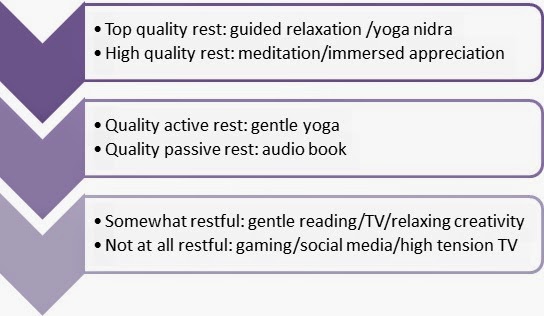I’ve realised recently that the quality of my rest has been taking a beating. I put this partly down to the fact that I’m becoming more and more addicted to social media. Ok, I might be sitting down whilst I’m checking out my facebook page, but processing all that information, finding bits you’re really interested in, is hardly restful. I’ve also had more mental energy recently and have been able to study for longer, so I’ve watching less TV. TV isn’t the highest quality rest you can have, but I do enjoy the benefits of letting go of my thoughts by immersing myself in the viewing experience.
The best rest is undoubtedly sleep but when we are awake, any rest that keeps your mind from straying into the realm of your busy restless thoughts comes a second best. When the mind has a light focus that doesn’t involve any kind of problem solving and very little information processing then we can completely relax. Without such a focus our mind will grab onto things that need to be solved or processed and remain active. Think about the times you’ve tried to get to sleep when you’re just not tired. With nothing to focus on, the mind just seems to get more and more active until you’re really quite wound up!
Guided relaxation, yoga nidra and mantra/visualisation based meditation all keep the mind lightly focused whilst allowing your nervous system to completely wind down. Another kind of meditation involves focusing the mind on just watching and letting things pass but I find this kind far more challenging. By offering your mind a light distraction audio books are thought to be very restful too.
I also grab small moments of quality rest when I immerge myself in the appreciation of natural joys. Watching the sparrows feeding their young can distract me from all other thoughts and fill a few moments with restful joy. I can also find moments like that looking at how my veg patch is growing or looking at a pretty flower.
Because relaxed effortlessness is a key aspect of my yoga practise I include yoga in my list of quality rest, I certainly feel replenished afterward. I also do it immediately before my evening meditation so it helps to prepare me for a more effective/restful meditation practise.
Reading a trashy novel and watching gentle TV do count towards rest for me, although they may not for people whose symptoms aren’t as mild as mine. But even so, I deliberately have to choose books and programmes with a relatively low tension content!
I originally thought this was a good thing that I’ve been watching less TV recently, but as it’s been replaced by mind stimulating social media or study, it means I’ve been losing out on rest. So I publicly resolve to include more rest in my day! A little more gentle TV to replace the social media I intend to cut back on will be one way. But a few more meditative moments of joy to break up the day into smaller segments between quality rest will also be good!
How do you include quality rest in your day?






It’s about a year since I discovered the importance of building pre-emptive rest into my day i.e. not waiting till I need to lie down before resting. I usually opt for a guided relaxation or reading a book. I tried listening to music, but I seem to either get over-involved and stimulated, or not engaged sufficiently to switch off from thinking.
I know you posted about your morning routine a while ago. Your mention of evening meditation etc has made me think that I’d be really interested to read about your “daily schedule”.
Nice to hear from you again Amanda. I apologise that its taken me so long to respond. You can read more about my daily routine in this post: http://www.themecfsholisticcoach.com/2013/01/cultivating-good-habits-and-helpful.html. I might write about it again one day soon because it might have evolved a little. Best wishes.
Fantastic! As a fanatic prescriber of ‘exertion conservation’ as a lifestyle that can create the possibility of a) living as normally as possible (while lying down as much as possible!) and b) actually gradually getting better, this blog is just brilliant. Seeing creative kinds of resting as positive ‘weapons in our fight to get better’ is just what we need to do. Our culture can only see us as ‘trying’ if we are throwing ourselves about, and every one of us know that only makes us worse. Pre-emptive rest is also a brilliant concept! A recent article in the journal Fatigue, Biomedicine, Health and Behavior, Energy conservation/envelope theory interventions Leonard A. Jason, et al. Volume 1, Issue 1-2, 2013, confirms that keeping activity levels below perceived energy levels on a daily basis results in gradual extension of the level of activity we can safely engage in (the ‘recovery’ not actually found in the PACE Trial, despite much fiddling with the figures).
My practical suggestions include using a wheelchair as a tool (you can sit in it, push it while conserving energy by leaning on the handles, carry parcels in it). If members of the public are bemused by someone in a wheelchair getting up to try on clothes, or getting up to do one dance and getting back in it, let it be a learning experience for them! Having a recliner in every room, or at least one room, means you can instantly and effortlessly move from working on a laptop, talking on the phone, lying flat for a few moments, minutes, or hours, as needed – without having to ‘go to bed’, and be isolated from the social areas of your home. Always keeping your head supported (it weighs more than 10 lb!) conserves the energy you need to keep up a social interaction or follow what is going on in a meeting. This is all about muscles – your blog is about the mind and the spirit – thanks so much for it!
Thank you so much for commenting Nancy. You’ve offered so many great suggestions that I’m sure will be helpful to many others who read this post! I’m sorry its taken me so long to respond! Best wishes.